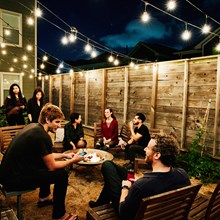Summer is quickly approaching. Rather than act surprised when it arrives, take some time now to decide how your group will handle the warmer months. A little planning can go a long way in the health of your group.
Many leaders feel it’s best to carry on as usual throughout the summer. While that can work, it’s not likely. First of all, many families take vacations during the summer, making the schedule hard to keep. On top of that, families tend to be busy as they take advantage of the warmer weather. And all those extra activities on the weekend may leave them exhausted during the week. On top of that, many churches tend to slow down during the summer. It will be an uphill battle to keep small groups humming along if every other ministry is taking a break.
But that doesn’t mean you have to take a three-month break from your small group. You’ve spent months developing those relationships, and you will lose a lot of momentum if you simply sign off for the summer. If you’re intentional about summer, this season can provide time for your group to break out of a rut, try something new, invest deeply in relationships, and more. Here are seven ideas for handling summer in your small group:
1. Meet Monthly for a Fun Activity
You could have a potluck, meet for ice cream, or even set up a game night that includes the kids. Ditch your study and focus on investing in one another relationally. Get to know one another on a deeper level as you simply spend time together.
2. Meet Monthly with a Missional or Outreach Focus
The summer is a great time to invest in your community and neighborhood. Plan one missional activity each month (June, July, and August) that your entire group can participate in. You could visit a nursing home to hang out and build relationships with residents, serve a meal at a homeless shelter, or take care of painting at a local school.
Alternatively, you could encourage one another in the missional ways you’re living each day. Check in about what you’re each doing individually, pray for open doors and good conversations, and even plan how you can come together to serve someone a group member has been building a relationship with. You’ll have fun serving together, deepen your relationships, and keep your focus on what God is doing in your community.
3. Try a New Study
Summer is a great time to mix up your routine. Try a study on a topic you’ve been interested in, check out a video study, or focus your time on spiritual disciplines like prayer. (Check out over 1,000 great studies here.) You could also ditch the study altogether and use your meetings to share your personal testimonies. As you share your stories with one another, you’ll deepen your relationships in amazing ways, and your discussions will have new meaning and depth. Groups don’t often have time for this during the year, but the summer can be the perfect time. Alternatively, have each group member sign up to lead a week and share one of their favorite verses or passages. Then discuss the importance of the passage.
4. Involve the Kids
Often in small groups with children, the adults talk in one room while the children play together in another. While there can be great benefits to this (It’s great to have adult conversations without toddlers pulling on your pant leg!), it can also be great to involve the kids sometimes. You could designate one night a month to involving the kids, or you could involve them every week if you’re brave. Plan a lesson or topic they can easily participate in. You might even put together a quick activity they can do. A really simple way to involve them is by having dinner together to start the meeting. However you involve them, the kids will benefit from seeing healthy adult interactions and from being loved on my so many adults other than their parents. The key: don’t plan anything that takes too long. If you think the adults in your group have short attention spans, you can’t imagine how short the kids’ attention spans are.
5. Take a Break
It’s not always a bad idea to take a break for the summer. Sometimes scheduling simply won’t work, or taking a break will free up group members to participate in other church activities over the summer. Another great reason: you need a break. Don’t beat yourself up. Do communicate clearly by the end of May what you plan to do and set a startup date in August or September before you break for the summer. That way everyone is prepared and informed. Then touch base with group members as often as makes sense. Even a quick note on Facebook can go a long way in staying connected through the summer months. (To determine whether you should take a break, check out these suggestions.)
Whatever you decide to do this summer, make sure you communicate clearly both what you’re doing and why you’re doing it. Taking a break from your usual routine can actually invigorate your group, so be sure to communicate that fact. Then ensure that everyone’s on the same page.
—Amy Jackson is the former managing editor of SmallGroups.com.












